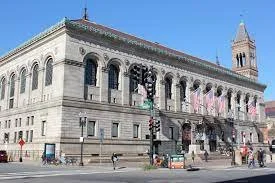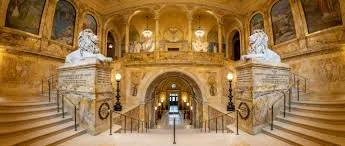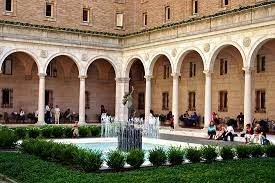BPL Trustees Hold November Meeting and Discuss Hiring Challenges and Plans for a Central Library Renovation
President’s Report.
The BPL Trustees met on November 16th, and kicked off with President David Leonard reporting that it has been a banner year for the library branches. There were ribbon cuttings at Adams Street and Roxbury, with Roslindale scheduled for December 12th. Both the Jamaica Plain and Roxbury Branches are recipients of One Percent for Art awards, and Utile Design, the architectural firm that designed the new Roxbury Branch at Nubian Square, received a 2021 AIA/ALA Library Building Award. Utile worked with the Boston Public Facilities Department and the BPL to complete the 27,000 square foot comprehensive renovation.
Next, Leonard introduced three new managers on the BPL team (two internal promotions and one new hire). Angelique Davis is a new Assistant Human Resources Manager and Jesse Snow is the new Assistant Manager of Youth Services. Sara Zaphiris has recently joined as Chief of Staff after many years of service with City and State government.
Addressing the collections ordering process issues that have been raised recently, Leonard stated that he shares the aim of improving current practices to ensure that good, relevant collections are available for all patrons. He commended those who have raised the issues as well as the staff who are working to assess and improve the process. He stated that there are no quick fixes and committed to having a more complete discussion of the subject at a future Trustees’ meeting.
Leonard noted that internal changes focused on diversity, equity, and inclusion at the BPL are ongoing and that while progress has been made on some fronts, much still needs to be done. “We have to do better valuing all of the voices. This is serious and urgent,” he said. This will be a key topic for the next Trustees meeting in January.
Segueing to what Leonard called “a staffing crisis,” he reported that although BPL has hired for some open positions, there remain 75 full-time slots to fill. As a result, the current limited central and branch library hours will continue into 2022. Leonard indicated that the staffing difficulties are a result of the 2020 pandemic hiring freeze, a larger number of retirements than usual, and staff “quality of life” choices about remote work and moving out of Boston.
In response to a question about diversity hiring, Leonard pointed out that the demographics of the library staff mirror the overall demographics of the City, but acknowledged that there is a dearth of diversity among library and technical professionals in general that causes pipeline challenges in meeting diversity hiring goals. He also noted that entry level positions can be difficult to fill because of a library requirement that people working for the City must live in the City, where the cost of living can be prohibitive. BPL is working with Simmons College to launch a program for 2022 to hire more people of color.
McKim Master Plan Presentation
BPL Central Library Dartmouth Street entrance
Janette Blackburn, Managing Principal of Shepley Bulfinch, the selected architectural firm for the renovation of the McKim Building Plaza, entrance, Johnson Building connections, and third floor patron access point, provided an overview of the Master Plan, with assistance from Kelly Brubaker, her colleague specializing in library planning. The project has four main phases: review and strategic direction, funding, design, and construction. The focus of the Plan is threefold: building improvement and sustainability, enhancing spaces for patrons to engage with collections, and renewal for modern library services. Input from the community focused on equitable access, improving wayfinding, and scholarship and stewardship that is open to all.
Challenges identified by Shepley Bulfinch include outdated building systems such as poor climate control, water incursion in some areas, level disparity between McKim and Johnson, lack of a public indoor route from McKim to Johnson, and an unwelcoming entrance/plaza not integrated with patrons’ needs.
Key elements of the Plan include transforming the third floor to be patron focused for reference, education, and collaboration; a new public elevator allowing access for people with disabilities; collaboration rooms; classroom space for learning from special collections; and significant updates to the infrastructure and systems. The Plan will allow patrons to utilize roughly 30% more of the McKim Building than under the current configuration.
On the second floor, the Plan contemplates an enclosed circulation path that allows patrons to move between rooms, as well as a multipurpose classroom.
BPL Central
The first floor will include a redesigned, open lobby, transparency into the orientation room, an additional opening between Johnson and McKim, and a skylight covering the courtyard. The skylight enclosure is deemed necessary to support preservation of the building, as facades are deteriorating from constant weather exposure. It will also allow for a significant increase in programming, as the courtyard will become usable year-round.
The Plan for the Dartmouth Street Plaza redesign celebrates the building, provides a better entrance with an integrated ramp, honors the historic architecture, and provides trees for shade and outdoor seating.
BPL Central courtyard
Renovations will be completed in phases, allowing for gradual funding and for keeping the library open during construction.
The Trustees expressed excitement about the Plan, particularly the skylight enclosure of the courtyard and voted to endorse this conceptual approach. Next steps involve engaging the new mayoral administration, addressing funding, which will include a combination of City, State, and private sources, and a feasibility study with presentations to the community for feedback.
New Business
Chairperson Pricilla Douglass announced the formation of the Special Collections Committee and the appointment of Trustee Ben Bradlee as the Committee’s Chair. Bradlee expressed excitement about the role.
Public Comments
Two individuals made public comments. One expressed the desire of the Roxbury community to have the name “Roxbury Branch at Nubian Square” changed to “Nubian Square Branch Library.” The other expressed concern about the possibility of storing collections in the basement, where they would be vulnerable to water damage. It was suggested that the collaborative spaces might be in the basement instead of the stored collections.



